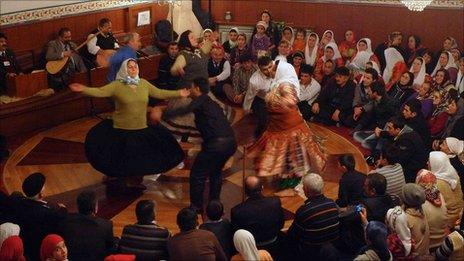Turkey election: Victorious Erdogan pledges 'consensus'
- Published
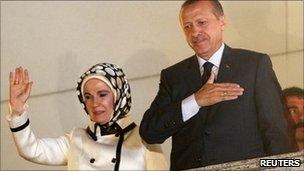
Mr Erdogan said the new constitution would "embrace all parties"
Turkey's Prime Minister Recep Tayyip Erdogan has promised to build consensus with opposition parties, after securing a third term in office.
Mr Erdogan's Justice and Development Party (AKP) won about 50% of the vote in Sunday's poll.
That translates to about 326 seats - a majority, but not enough to make unilateral constitutional changes.
Mr Erdogan had widely been expected to win despite being accused by some of an authoritarian style of leadership.
With almost all of the ballots counted, local media said that the AKP had secured 326 of the 550 seats in parliament.
That is short of the "super majority" of 367 that would have enabled the party to push through constitutional changes on its own; or the 330 the party would have needed to put its own proposals directly to a public referendum.
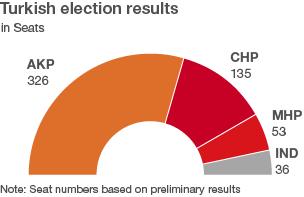
Many Turks accept the need to modernise the constitution, which was written three decades ago following a military coup, says the BBC's Jonathan Head in Istanbul.
But there was concern that with a super-majority, the prime minister might reject consensus and write a constitution that helped cement his party's grip on power. Analysts say he may be planning to put more powers in the hands of the presidency - and eyeing up the post for himself.
Strong growth
Accepting his victory in Ankara, Mr Erdogan said his party would be "humble".
"The people gave us a message to build the new constitution through consensus and negotiation," said the prime minister.
"We will be seeking consensus with the main opposition, the opposition, parties outside of parliament, the media, NGOs, with academics, with anyone who has something to say."
Mr Erdogan said the AKP and others would write a "civilian, free constitution which embraces all parties of the society together".
In his victory speech, Mr Erdogan also alluded to Turkey's aspiration to be a voice in the West for the Middle Eastern region and Muslims, saying Bosnians, Lebanese, Syrians and Palestinians also benefited from his victory.
"Believe me, Sarajevo won today as much as Istanbul, Beirut won as much as Izmir, Damascus won as much as Ankara, Ramallah, Nablus, Jenin, the West Bank, Jerusalem won as much as Diyarbakir."
More than 50 million people, about two-thirds of Turkey's population of 73 million, were eligible to vote in Sunday's election. NTV television said turnout was 84.5%.
The newspaper Today's Zaman said there would be a record 78 female MPs - up from 50 in the last parliament.
AKP supporters were celebrating on the streets of the capital on Sunday night.
"I am truly happy. I hope the outcome will be in favour of our country and nation. I cannot find words to express my happiness," said one man.
Our correspondent says Turkey now faces another four years with Mr Erdogan the dominant figure, and his AKP pretty much able to do what it likes in parliament.
The secular Republican People's Party (CHP) won about 26% of the vote with 135 seats - 23 more than last time, and the far-right Nationalist Movement Party (MHP) with 13% had 53 seats, down 18.
Kurdish success
Independent candidates fielded by the pro-Kurdish Peace and Democracy Party (BDP) also did well in the south-east, winning 5.8% of the vote and 36 seats.
"This is a huge success for us," prospective Kurdish MP Serafettin Elci told Reuters.
"We expect the PM to signal a strong hope for the solution of the Kurdish problem for Turkey's future."
Our correspondent says this will increase pressure on the government to address its long standing demands for greater autonomy and official recognition of Kurdish identity.
The AKP, which has Islamist roots, has presided over strong economic growth and a more assertive foreign policy since taking power in 2003.
It has also seen unemployment fall - down to 11.5% in March from 14.4% in the same period last year. The country is a member of Nato as well as a candidate for membership of the European Union.
- Published24 March
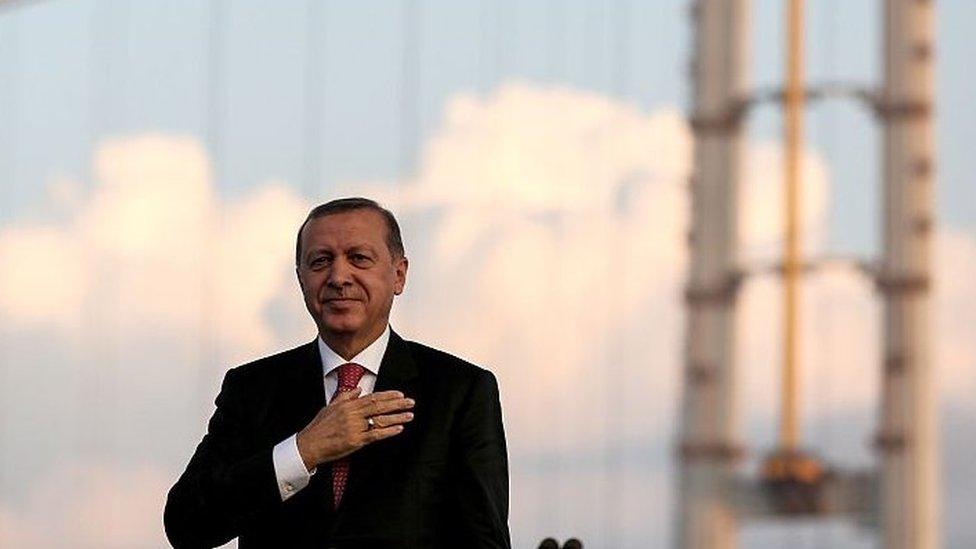
- Published13 June 2011
- Published13 June 2011
- Published13 June 2011
- Published11 June 2011
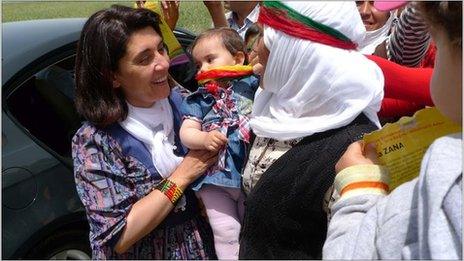
- Published10 June 2011
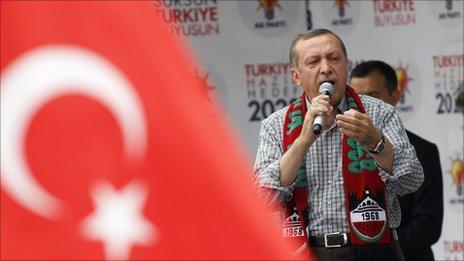
- Published10 June 2011
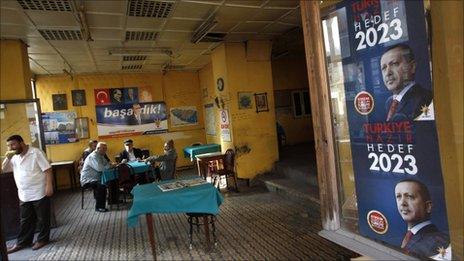
- Published4 June 2011
